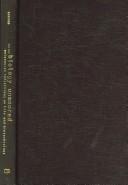| Listing 1 - 2 of 2 |
Sort by
|
Book
ISBN: 1283035413 9786613035417 140083872X 9781400838721 9780691141787 0691141789 9781283035415 Year: 2011 Publisher: Princeton, N.J. : Princeton University Press,
Abstract | Keywords | Export | Availability | Bookmark
 Loading...
Loading...Choose an application
- Reference Manager
- EndNote
- RefWorks (Direct export to RefWorks)
"Though it did not yet exist as a discrete field of scientific inquiry, biology was at the heart of many of the most important debates in seventeenth-century philosophy. Nowhere is this more apparent than in the work of G. W. Leibniz. In Divine Machines, Justin Smith offers the first in-depth examination of Leibniz's deep and complex engagement with the empirical life sciences of his day, in areas as diverse as medicine, physiology, taxonomy, generation theory, and paleontology. He shows how these wide-ranging pursuits were not only central to Leibniz's philosophical interests, but often provided the insights that led to some of his best-known philosophical doctrines.Presenting the clearest picture yet of the scope of Leibniz's theoretical interest in the life sciences, Divine Machines takes seriously the philosopher's own repeated claims that the world must be understood in fundamentally biological terms. Here Smith reveals a thinker who was immersed in the sciences of life, and looked to the living world for answers to vexing metaphysical problems. He casts Leibniz's philosophy in an entirely new light, demonstrating how it radically departed from the prevailing models of mechanical philosophy and had an enduring influence on the history and development of the life sciences. Along the way, Smith provides a fascinating glimpse into early modern debates about the nature and origins of organic life, and into how philosophers such as Leibniz engaged with the scientific dilemmas of their era"-- "his book provides a comprehensive survey of G. W. Leibniz's deep and complex engagement with the sciences of life, in areas as diverse as medicine, physiology, taxonomy, generation theory, and paleontology. It is shown that these sundry interests were not only relevant to his core philosophical interests, but indeed often provided the insights that in part led to some of his most familiar philosophical doctrines, including the theory of corporeal substance and the theory of organic preformation"--
SCIENCE / History --- SCIENCE / Philosophy & Social Aspects --- PHILOSOPHY / History & Surveys / Modern --- Science --- Life sciences --- Biosciences --- Sciences, Life --- Philosophy --- History --- Leibniz, Gottfried Wilhelm, --- Knowledge --- Science. --- Aristotle. --- Creation. --- Descartes. --- G. W. Leibniz. --- Georg Ernst Stahl. --- Hobbes. --- John Ray. --- anatomy. --- animal bodies. --- animal economy. --- animal motion. --- biological species. --- biology. --- chemistry. --- divine preformation. --- fetal development. --- generation theory. --- iatrochemistry. --- life science. --- life sciences. --- living bodies. --- maternal imagination. --- medicine. --- natural generativity. --- natural philosophy. --- organic body. --- organic life. --- organs. --- paleontological forms. --- paleontology. --- philosophy. --- physiology. --- seventeenth century. --- seventeenth-century empirical research. --- seventeenth-century philosophy. --- spontaneous generation. --- taxonomy.

ISBN: 1282358375 9786612358371 0520939476 1433701383 9780520939479 9781433701382 9781282358379 9780520247123 0520247124 9780520247130 0520247132 6612358378 Year: 2007 Publisher: Berkeley : University of California Press,
Abstract | Keywords | Export | Availability | Bookmark
 Loading...
Loading...Choose an application
- Reference Manager
- EndNote
- RefWorks (Direct export to RefWorks)
Biology Unmoored is an engaging examination of what it means to live in a world that is not structured in terms of biological thinking. Drawing upon three years of ethnographic research in the highlands of Papua New Guinea, Sandra Bamford describes a world in which physiological reproduction is not perceived to ground human kinship or human beings' relationship to the organic world. Bamford also exposes the ways in which Western ideas about relatedness do depend on a notion of physiological reproduction. Her innovative analysis includes a discussion of the advent of assisted reproductive technologies (ARTs), the mapping of the human genome, cloning, the commodification of biodiversity, and the manufacture and sale of genetically modified organisms (GMOs).
Genetic engineering. --- Biotechnology. --- Ethnobiology --- Ethnoecology --- Human body --- Hamtai (Papua New Guinean people) --- Designed genetic change --- Engineering, Genetic --- Gene splicing --- Genetic intervention --- Genetic surgery --- Genetic recombination --- Biotechnology --- Transgenic organisms --- Chemical engineering --- Genetic engineering --- Folk biology --- Folkbiology --- Indigenous peoples --- Traditional biology --- Biology, Economic --- Ethnoscience --- Body, Human --- Human beings --- Body image --- Human anatomy --- Human physiology --- Mind and body --- Anga (Papua New Guinean people) --- Hamday (Papua New Guinean people) --- Kamea (Papua New Guinean people) --- Kapau (Papua New Guinean people) --- Kukukuku (Papua New Guinea people) --- Kukukuku (Papua New Guinean people) --- Kukukuku (Papuan people) --- Watut (Papua New Guinean people) --- Ethnology --- Papuans --- Human ecology --- Traditional ecological knowledge --- Social aspects --- Psychology. --- Agriculture. --- Ethnobiology. --- Ecology --- Gulf Province (Papua New Guinea) --- Gulf District (Papua New Guinea) --- Social life and customs. --- Aboriginal peoples --- Aborigines --- Adivasis --- Indigenous populations --- Native peoples --- Native races --- assisted reproductive technologies. --- biodiversity. --- biologists. --- biology. --- biotechnology. --- cloning. --- environmental impacts. --- ethnographers. --- ethnographic research. --- genetically modified organisms. --- gmos. --- human condition. --- human genome mapping. --- human impact. --- human relationships. --- melanesia. --- natural world. --- nonfiction. --- organic life. --- papua new guinea. --- physiological. --- reproduction. --- reproductive technologies. --- sex and culture. --- sexual reproduction. --- social science. --- western ideas.
| Listing 1 - 2 of 2 |
Sort by
|

 Search
Search Feedback
Feedback About UniCat
About UniCat  Help
Help News
News